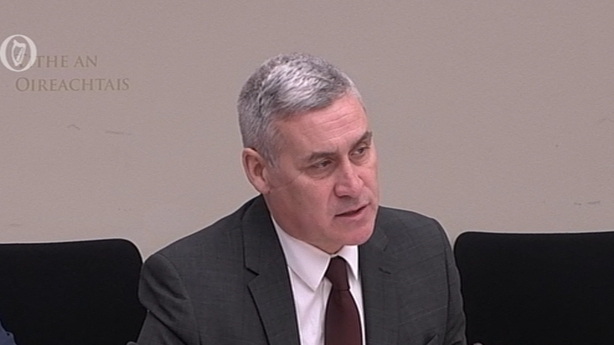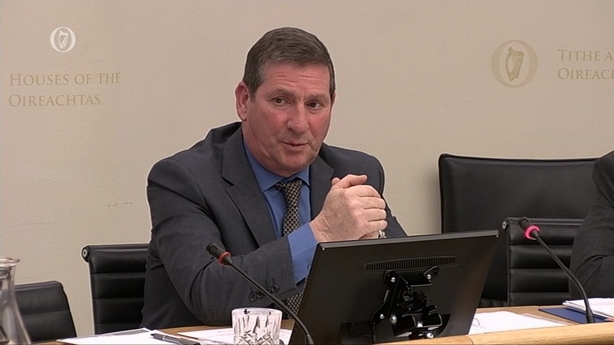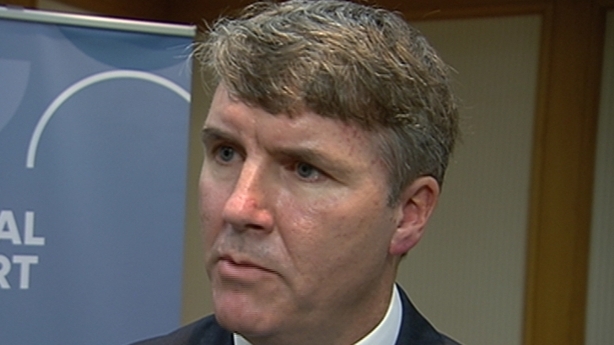Mandatory reporting of child abuse concerns will place children and families at risk and should not be introduced, the Child and Family Agency Tusla has argued.
In documents released to RTÉ’s This Week under Freedom of Information, repeated warnings were given by Tusla to the Department of Children that mandatory reporting, due to be introduced in January 2018, will place serious pressure on its child protection services and reverse the progress it has made in dealing with social work waiting lists.
Responding to the concerns outlined in the documents, the Office of the Ombudsman for Children has called for Tusla to be properly resourced to implement the reporting regime.
In a letter to the Department of Children and Youth Affairs in August 2016, Tusla Chief Executive Fred McBride outlined his concerns about the reporting regime, which is contained in the Children First legislation.
"I have serious concerns regarding the commencement of the mandatory reporting aspect of the Children First Act. Evidence from other jurisdictions indicates that mandatory reporting could increase referrals to the Agency by 150%..."On this conservative basis the immediate impact of the introduction of mandatory reporting will be to reverse all progress made in respect of unallocated cases and will result in increased waiting lists, including retrospective allegations of abuse, in direct proportion to the increased level of referrals".

In the same letter Mr McBride went on to recommend that mandatory reporting not be introduced: "I am therefore reiterating our recommendation that mandatory reporting is not introduced at all due to the impact this will have on services and our limited capacity to respond with little evidence from other jurisdictions that outcomes for children are improved.
"Indeed I have sent documentation to your department setting out the intention of the Australian authorities to dismantle mandatory reporting as they deem it to be wholly counter-productive".
As a last resort, the Tusla Chief Executive called for the reporting obligations to be delayed until January 2018 to allow the agency to prepare for their impact: "If it remains the intention of Government to proceed with the enactment of mandatory reporting then my strong contention is that this should be deferred until January 2018 to [sic] the reasons set out above.
"If there is neither deferral of enactment nor sufficient investment in Tusla’s preparation in line with the business case submitted, then it is my strong view that this will pose significant further risk to services to children and families".
The Department of Children agreed to the deferral, but insisted that 1 February 2018 was the latest possible date for mandatory reporting to be implemented.
In a letter from Department Secretary General Fergal Lynch, Mr McBride was told: "The minister has asked that I emphasise her concern that her agreement to this proposal should not in any way be interpreted as to allow for any delay in preparation for the full implementation of the legislation and she expects that, in circumstances where the timeline has been proposed by Tusla, all necessary resources will be in place and fully operate and all necessary preparations will be completed by 1 February 2018".
"By now you will be aware of the significant additional resources that have been assigned to Tusla under Budget 2017 to strengthen its overall funding level and provide increased capacity to respond to areas of identified risk and anticipated demand.
"This includes resources to prepare during 2017 for the phased implementation of Children First".
In 2017 Tusla’s funding did not match the figure it estimated it would need to implement Children First.
A Tusla document ‘Survival to Sustainability’ outlined that the agency would need an additional €102m in 2017 to address deficits in its services.
Of this the agency said it would need €38m to prepare for mandatory reporting referrals, estimated to be between 22,000 and 65,000 additional reports, resulting from the Children First legislation.
The agency’s total allocation in 2017 was €37m; €65m less than the amount it had requested.

In April 2017, Tusla Chief Operations Officer Jim Gibson again warned the Department of Children that out of hours referrals would be particularly problematic for the agency following the introduction of Children First: "The arrangement for accepting reports from mandated persons out of hours remains a concern for us and I know this has been discussed previously with input from our legal team".
Mr Gibson also expressed concern that other agencies would not be ready for the introduction of mandatory reporting: "Tusla cannot be expected to hold central responsibility to manage all the implementation issues.
"Sectoral leadership is required to meet that demand. Our concern is that a lack of preparation/readiness across the sector will seriously affect Tusla’s resource capacity to meet its obligations under Children First.
"Perhaps in this regard you may be able to present at our meeting the steps being taken by the DCYA to mitigate against these risks."
The new legislation, which is to be commenced at the end of 2017, will put a legal obligation on ‘Mandated Persons’ including dentists, teachers, youth organisations and gardaí to report concerns about a child being at risk.
The act requires "where a mandated person knows, believes or has reasonable grounds to suspect that a child is being harmed, has been harmed or is at risk of being harmed, they must report that belief or suspicion to the agency. The mandated person must also report disclosures by a child".
In July, Mr McBride told This Week that he continued to have concerns about the introduction of Children First.
"We’ve made the case repeatedly that we think that mandatory reporting will cause us additional pressures on our services. There’s, I think, lessons from jurisdictions elsewhere that have introduced mandatory reporting that would demonstrate that, we’ve made that case.
"The risks are that referrals will increase further and unless we are resourced at our front door we won’t be able to deal with that volume of referrals and it’s likely then that unallocated cases may go up. We’ve made those concerns known and we will be trying our very best to ensure that we are geared up for its commencement."

Ombudsman for Children Niall Muldoon issued a statement to This Week in response to the concerns raised by Tusla in the documents released under FOI.
He called for greater support to be given to the agency to implement mandatory reporting, which he supports: "I have consistently called for Tusla to be adequately resourced for this new legislation and I have stated that to a number of Oireachtas committees and to the Minister for Children and Youth Affairs.
"Tusla’s figures and graphs suggest that referrals of child abuse could more than double with the advent of mandatory reporting. They also suggest that this is a reason to not introduce mandatory reporting at all. I would have the opinion that such estimates make it even more urgent that we bring this law into force, and do everything in our power to allow the voices of these young people to be heard so that appropriate help can be provided.
"It is clear that the Department of Children and Youth Affairs is committed to implementing mandatory reporting and I believe the time has come to bring this law into force. It is essential that they continue to work with Tusla to ensure that they have sufficient resources so that any new referrals will be dealt with appropriately."

